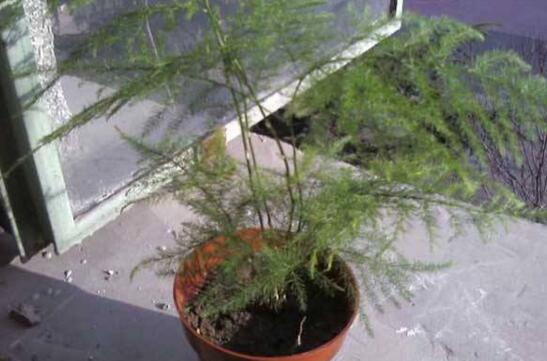Why does asparagus grow so fast? you can easily solve the confusion by learning five tricks.
Everyone hopes that their asparagus can grow well and have thick branches and leaves, but sometimes asparagus grows excessively, resulting in excessive height and distortion of the plant, which is a great headache at this time. what if we encounter asparagus growing like crazy? The editor can teach you 5 tricks to solve the problem.
Why asparagus grows so fast

If we raise asparagus according to the breeding methods and matters needing attention, it is quite common for asparagus to grow excessively, and the main reasons for its excessive growth are excessive fertilization, neglect of pruning, little light, too much watering, and so on. So what should we do if asparagus grows too fast? You can easily solve this confusion by learning the following five tips.
What if asparagus grows wildly?
Be diligent in pruning
Sometimes asparagus crazy growth is a normal phenomenon, because in the vigorous growth period, its growth is relatively rapid, at this time should help asparagus pruning, can cut off the longer old branches, but need to be careful not to hurt the roots.
2. Reduce fertilization
When fertilizing too much, it will lead to overnutrition, which will lead to faster-than-normal growth of asparagus. What should we do if we fertilize too much? We have introduced in detail how to apply fertilizer in asparagus, and we can refer to the specific methods.
3. Too little light
Asparagus is a kind of plant that likes a cool environment, so some people like to put it in a place where there is no light, which will lead to the plant growing too fast, but the tissue inside is not full. When crazy growth occurs, check whether it is caused by too little light. What if this cause asparagus to grow too much? Move it to a place with plenty of light.
4. Too much watering
Planting asparagus advocates more watering, but it does not mean that asparagus should be watered many times every day. Too much watering will cause a lot of problems, as long as the soil is not dried up.
5. Help asparagus shape
If asparagus grows excessively, it can be made into a frame with bamboo or iron wire and fixed on the changing basin, which can make the branches of asparagus cling to the frame and guide its growth, which is not only conducive to the growth of asparagus, but also makes it more beautiful.
Conclusion: although the excessive growth of asparagus will not bring direct harm, but it will affect its appreciation, and learning the above tips can solve the problem of excessive growth, but no matter which method it is, we must be careful not to sacrifice the normal growth of asparagus.
What if the asparagus leaves turn yellow? learn 8 tricks to get the leaves back to normal.
Under normal circumstances, the leaves of asparagus should be green all the year round, but if you do not pay attention to the breeding methods and precautions of asparagus, it may lead to the phenomenon of leaf yellowing, so how to do the leaves yellowing? We need to know the reason why asparagus leaves turn yellow before we can take corresponding measures.
What if the leaves of asparagus turn yellow?
There are many reasons for the yellowing of asparagus leaves, such as too little or too much watering, too dry air, too strong light, too low temperature and so on. What about the yellowing of asparagus leaves? The following editor lists the corresponding treatment methods for different reasons.
1. Too much watering
Reason: too much watering will lead to stagnant water in the basin soil, excess water can not be discharged through the holes at the bottom, resulting in root rot, which leads to yellow leaves.
Treatment: each watering is not easy to overdose, you can use a simple way to judge whether watering is needed, such as inserting a toothpick into the soil, the depth is 2-3 cm, and then take it out 10 minutes later. If it is dry, it needs watering, and if it is not dry, it does not need watering. Avoid stagnant water.
2. Too little watering
Reason: it is very difficult for asparagus leaves to turn yellow in a humid environment, and most of the leaves turn yellow because of too little watering, so what to do when the leaves turn yellow? Here's how to do it.
Treatment: cut off the yellowing leaves and water every 4-5 days in spring and autumn. Pay attention to watering thoroughly. Water evaporates quickly in summer and can be watered every 3-4 days.
3. The air is too dry
Reason: because the leaves of asparagus are relatively small, the leaves are easy to turn yellow in a dry air environment.
Treatment: use a sprayer to spray water on asparagus leaves every day when the air is dry, and you need to do it once in the morning and evening in summer.
4. The light is too strong
Reason: asparagus is a plant that likes shade, the biggest taboo is to let the sun shine directly on it, if the light is too strong, it often causes the leaves to turn yellow.
Solution: put asparagus in a bright place, but do not go near the windowsill to avoid direct sunlight. Reducing the light can improve the yellowing of the leaves.
5. Oil fume pollution
Reason: although purifying the air is one of the functions and effects of asparagus, if it is allowed to stay in an environment with more oil fumes for a long time, it is bound to make asparagus appear yellow leaves.
Treatment: spray the leaves of asparagus with clear water, try to wash the yellowed leaves, and then move the asparagus to a ventilated place.
6. Fertilize too much
Reason: asparagus likes fertilizer, but too much fertilizer will cause its leaves to turn yellow, so fertilization should be less rather than more.
Treatment: pour rotten rice water, bean cake water, or soy bean water; you can also take off the soil and change the basin.
Asparagus leaves turn yellow in winter
In the coming winter, two tricks can prevent the leaves from turning yellow, namely: covering plastic bags and moving to a sunny room.
1. Set up plastic bags
If it is a kind of asparagus which can not be moved outdoors, you can put plastic bags on its plant jacket, which can play a certain role in heat preservation, but it should be noted that the plastic bags are not completely sealed.
2. Move indoors
If it is potted asparagus, it can be moved to a sunny place indoors, as long as the temperature is suitable, then the leaves of asparagus can return to normal emerald green when spring comes.
Conclusion: asparagus leaves yellowing must be for a reason, find the reason and then take corresponding measures, can improve the phenomenon of yellowing leaves, can make asparagus renewed vitality, so do not give up when you see this phenomenon.
How to raise asparagus, the breeding methods and points for attention / need to learn 5 tricks
As a highly ornamental plant, the function and efficacy of asparagus are well known by more and more people. Many people try to raise some asparagus at home, but they don't know how to raise asparagus. Today, the editor will bring you detailed methods and points for attention, and answer how to raise asparagus more exuberantly.
How to raise asparagus
If you want to know how to raise asparagus, you must first know its growth characteristics. The most suitable growth environment of asparagus is warm, humid and semi-shady and ventilated. It is not resistant to cold and drought. It likes sandy soil with good drainage, likes fertilizer and avoids strong light.
Culture methods and matters needing attention of asparagus
1. How to water asparagus
Asparagus is a drought-resistant plant, so we must pay attention to more watering when planting, and the watering times can be adjusted according to different growth periods and seasons, such as watering once a day in spring and one in the morning and evening in summer.
Note: when watering, do not water too much at a time, it will lead to stagnant water in the basin to make the roots rot, and then lead to yellow leaves, etc., in principle is to keep the basin soil moist.
2. Suitable lighting of asparagus
Asparagus prefers a semi-shady environment and can grow well in scattered light, so it can be placed indoors in sunny places in spring and autumn, sunny places in winter, and shady places in summer.
Note: in the cultivation methods and matters needing attention of asparagus, light is very important, too strong light will cause leaves to fall off; too weak light will hinder the growth of asparagus, so the position of asparagus should be adjusted according to the actual situation. give it the right light conditions.
3. How to fertilize asparagus
Asparagus is a kind of fertilizer-loving plant, and the demand for fertilizer is high during the growing period. It can be applied every 15-20 days in spring and autumn. Organic liquid fertilizer can be selected, nitrogen, phosphorus and potassium fertilizer can also be applied, and 0.1% urea and 0.1% potassium dihydrogen phosphate can be applied.
Note: fertilization can be stopped in summer and winter, but do not apply too much fertilizer each time, otherwise steep growth may occur, which will affect the appearance and even destroy the plant shape. If you want the plant to be too tall, you can apply less nitrogen fertilizer and liquid fertilizer.
4. What soil does asparagus need?
Asparagus needs loose, fertile and well-drained sandy soil, preferably rich in humus, which can be prepared in the proportion of 4 parts of garden soil, 2 parts of rotten leaf soil, 2 parts of compost soil and 1 part of sand.
Note: the basin soil should be changed regularly. If the root watering phenomenon is caused by excessive fertilization, the fertilizer should be poured out in time, and the soil block should be irrigated with clean water, and then the basin soil should be replaced and raised again.
5. What temperature is suitable for asparagus?
In the cultivation methods and matters needing attention of asparagus, temperature is also a factor that can not be ignored. The most suitable temperature for asparagus is between 15 and 25 degrees. If raised indoors, the temperature should be kept at 12 to 18 degrees.
Note: if asparagus is kept indoors, when the temperature exceeds 20 degrees, it should be well ventilated, which is conducive to heat dissipation; when the temperature is below 5 degrees in winter, it should be insulated, covered with insulation bags, and so on.
Management of asparagus in four seasons
1. Spring
The pot of asparagus should be changed at the end of spring, and the growth of asparagus is more exuberant in spring, so we can fertilize the seedlings twice to ensure adequate water supply and pay attention to increase air humidity.
2. Summer
The temperature is high and the light is strong in summer, so put asparagus indoors in a bright and ventilated place, keep the soil moist, and often spray water on its leaves without fertilization.
3. Autumn
The temperature will gradually decrease in autumn, when asparagus will once again enter the period of vigorous growth, pay attention to the supply of water and fertilizer and the supplement of air humidity. After the temperature drops at the end of autumn, attention should be paid to maintaining the indoor temperature, and when it is about to enter winter, the number of watering should be gradually reduced.
4. Winter
Asparagus can be placed in the environment of 5 degrees for a short time, but do not let it stay in low temperature for a long time, the growth of asparagus will stop in winter, the plant needs to ensure a certain amount of light, and the temperature can be above 10 degrees.
How to raise asparagus to be more vigorous
In addition to following the methods and precautions mentioned above, in order to make asparagus grow more vigorously, we also need to prune it in time. Cutting off old branches and leaves can promote the growth of new leaves and reduce the loss of nutrients.
Summary: this paper introduces in detail the breeding methods and matters needing attention of asparagus, the key is to create a suitable growth environment for asparagus from the aspects of soil, temperature, moisture, fertilizer and light, and to make it grow more exuberant. pruning is also essential.
- Prev

How to fertilize asparagus and what kind of fertilizer is best / time method is very important
We know that in the top ten points for attention in asparagus culture, reasonable fertilization is very critical, so how to apply fertilizer is reasonable? How long does asparagus fertilize? How to deal with asparagus if it is fertilized too much? The following editor will answer them one by one. How to fertilize asparagus is not as simple as pouring fertilizer into pot soil.
- Next

How to prune asparagus? the pruning method diagram / method of asparagus varies with stage.
Through the top ten points for attention in asparagus culture, we know the importance of pruning in asparagus culture, but although many people know that pruning is very important, they do not know the correct pruning method, so how to prune asparagus is the best? Next, we will use the diagram of asparagus pruning method to tell you the answer.
Related
- Fuxing push coffee new agricultural production and marketing class: lack of small-scale processing plants
- Jujube rice field leisure farm deep ploughing Yilan for five years to create a space for organic food and play
- Nongyu Farm-A trial of organic papaya for brave women with advanced technology
- Four points for attention in the prevention and control of diseases and insect pests of edible fungi
- How to add nutrient solution to Edible Fungi
- Is there any good way to control edible fungus mites?
- Open Inoculation Technology of Edible Fungi
- Is there any clever way to use fertilizer for edible fungus in winter?
- What agents are used to kill the pathogens of edible fungi in the mushroom shed?
- Rapid drying of Edible Fungi

